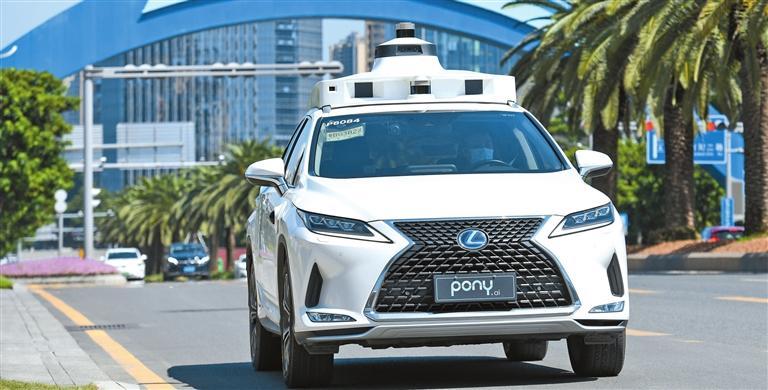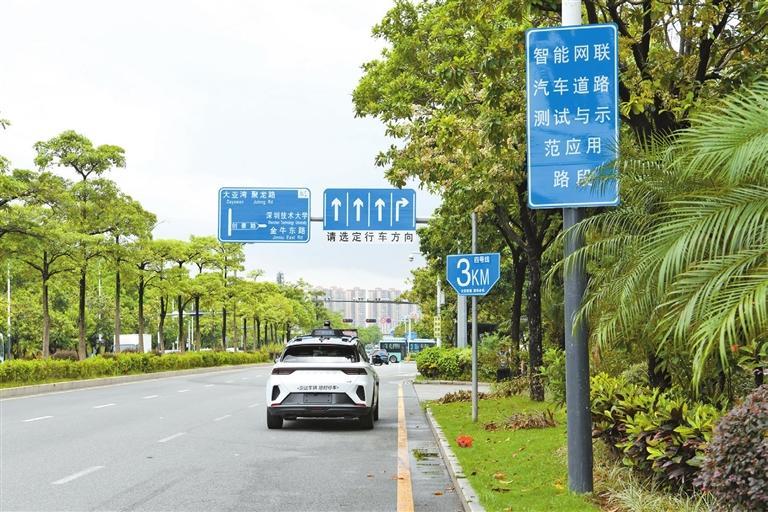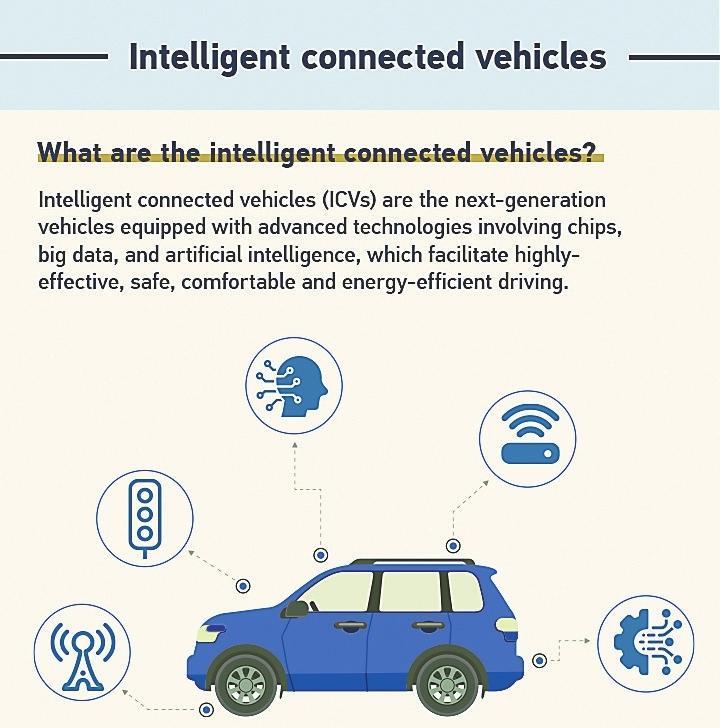
A Pony.ai smart car runs on a road designated for ICV testing in Shenzhen's Qianhai area. Photos from Xinhua

An intelligent connected car runs on a road designated for ICV testing in Shenzhen's Pingshan District.

Chinese automakers, having surged to the forefront of the global new energy vehicle (NEV) market, are now exploring strategies to gain an advantage over their competitors in the next phase of the market race, which is increasingly driven by the development of intelligent technologies and artificial intelligence.
"Intelligent connected vehicles (ICVs) have become a focus of industry innovation, and Chinese automobiles are accelerating into a new stage with intelligence as their core competitiveness," Li Shufu, chairman of Geely Holding Group, said at the World Intelligent Connected Vehicles Conference (WICV) last week.
Li added that the entire Chinese auto industry must rise to the challenges of seizing the opportunities presented by intelligent technologies and promoting China's transformation into an automotive powerhouse.
Geely, like many of China's leading car companies, has made significant strides in intelligent innovation, driving advancements in areas such as automobile safety, human-machine interaction, intelligent driving, onboard chips, and low-orbit satellites.
According to Zhu Huarong, chairman of Chongqing Changan Automobile Co., sales of China's ICVs grew rapidly this year and are projected to reach 17 million vehicles, with a penetration rate surpassing 63%.
Minister of Industry and Information Technology Jin Zhuanglong said that a comprehensive industrial system for China's ICV sector has taken shape, covering products and technologies such as basic chips, sensors, computing platforms, and chassis control.
Jin also noted that China leads the world in human-machine interaction and is rapidly advancing toward breakthroughs in technologies like steer-by-wire and active suspension technologies, among others.
The country's ICV sector currently boasts nearly 400 "little giant" firms — novel, elite small and medium-sized enterprises that engage in manufacturing, specialize in a niche market, and hold cutting-edge technologies, according to Jin. Five Chinese LiDAR companies rank among the global top 10 in terms of sales, and nine automotive manufacturers are piloting conditional automated driving models.
Smart transformation
Lei Jun, founder and CEO of Xiaomi, revealed last week that the company expects to deliver more than 20,000 units of its first self-developed NEV model, the SU7, this month and achieve its annual delivery target of 100,000 vehicles in November. "In the next five years, the structure of the entire automotive industry will be reconstructed on a large scale," Lei said.
The CEO noted that the entire industry should engage in friendly competition and work together to explore the international market. Lei also urged Chinese automakers to avoid redundant investments and focus on creating a smart automotive ecosystem.
Xiaomi ventured into the NEV market in 2021, establishing a 700,000-square-meter factory in Beijing's Economic-Technological Development Area, also known as Beijing E-Town, which is a hub for innovation in China's autonomous driving industry.
"These models are produced at the Xiaomi auto factory. A new car rolls off the production line every 76 seconds there," said Ou Wantong, an auto retail consultant for Xiaomi.
According to Zeng Qinghong, chairman of GAC Group, more than half of the top 100 chip design companies in China, and over 40% of the country's top 50 internet firms, have entered the automotive industry.
Global players like Volkswagen are also speeding up their intelligent transformation in a bid to expand their presence in the Chinese market.
In addition to building its largest development center outside Germany in the eastern Chinese city of Hefei, Volkswagen is also strengthening cooperation with local manufacturers like Xpeng and high-tech companies such as Horizon Robotics, Thundersoft, and Gotion.
"China is driving the future of the automotive industry, and we are committed to being part of this journey in the era of ICVs," said Ralf Brandstaetter, chairman and CEO of Volkswagen Group China.
Smart industry chain
In recent years, with the continuous innovation of technology and the strong support of policies, China has been accelerating the formation of an intelligent automobile industry chain.
More than 50 cities have designated over 32,000 kilometers of roads for ICV testing and upgraded about 10,000 kilometers of roads with smart technologies, according to the Ministry of Industry and Information Technology.
"China has achieved phased results in the fields of new energy, intelligent cockpits, and intelligent driving, but in terms of the upstream of the industrial chain, especially chips with high performance, high processing, and high security, there is still a gap between us and the global advanced level," said Li of Geely.
However, the good news is that many carmakers and tech firms in China are revving up the development and production of domestic chips.
Qiu Xiandong, chairman of FAW Group, revealed last week that the company will focus on 460 key technologies in the future, especially developing a system-on-chip (SoC) with multi-domain integration. A total of 42 models of ICVs are expected to be launched by the company in the next five years.
Founded in 2022, tech company Huixi released its first high-performance intelligent driving chip, which is based on a 7-nanometer automotive-grade process, last week. It will provide strong computing support and solutions for promoting automatic driving and intelligent applications.
SemiDrive, another leading tech firm focusing on automotive-grade chip products for intelligent cockpits and smart vehicle control, has mass produced over 6 million units across its product series. These chips have been used by more than 260 commercial customers, covering over 90% of Chinese car manufacturers and several major international auto firms, according to Chen Shujie, vice president of the company.
"We must master core competitiveness and build a stable, reliable, and competitive industry chain system of ICVs, which is the basis for the sustainable and high-quality development of the industry," Li of Geely said. (Xinhua)
















